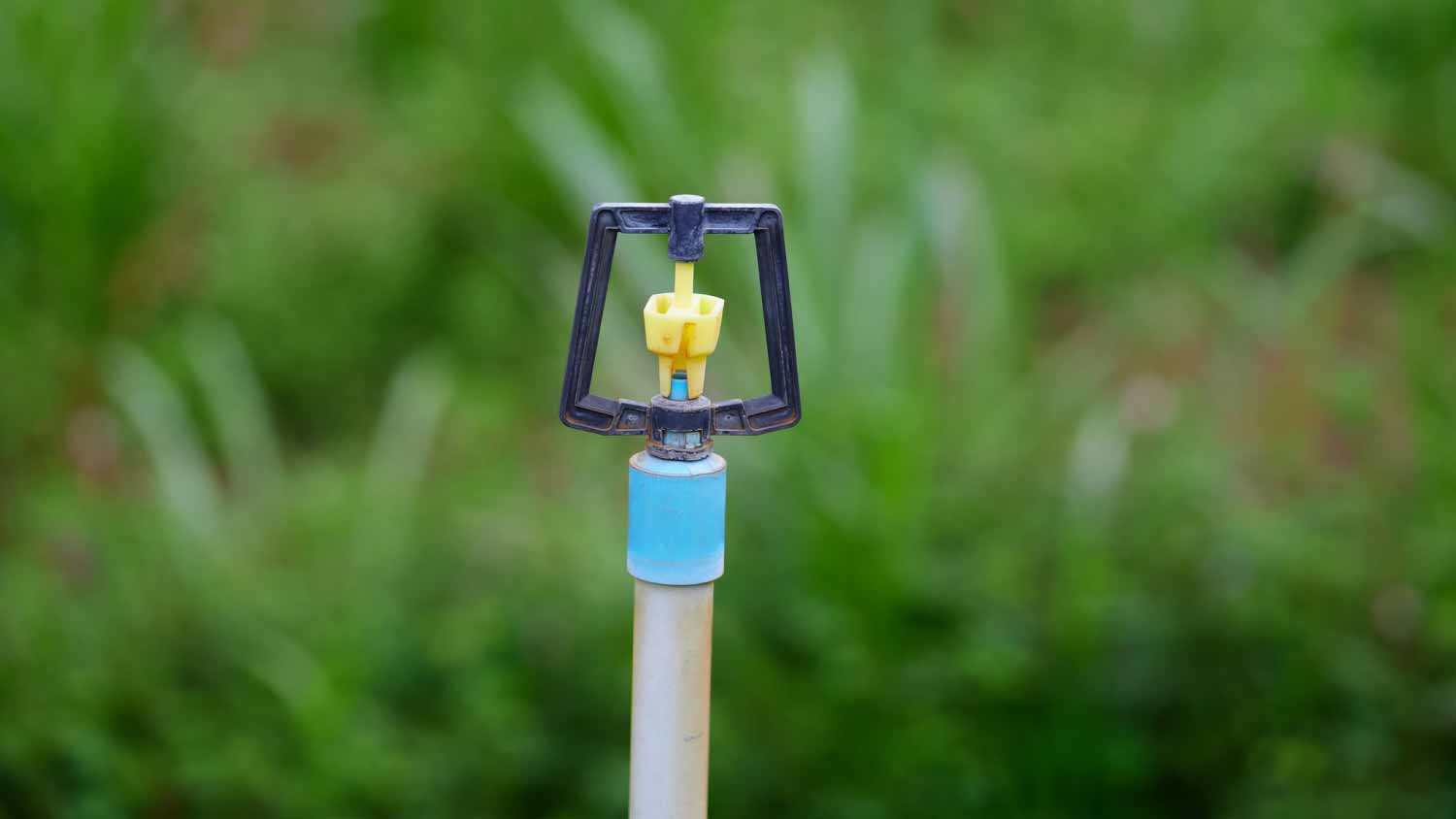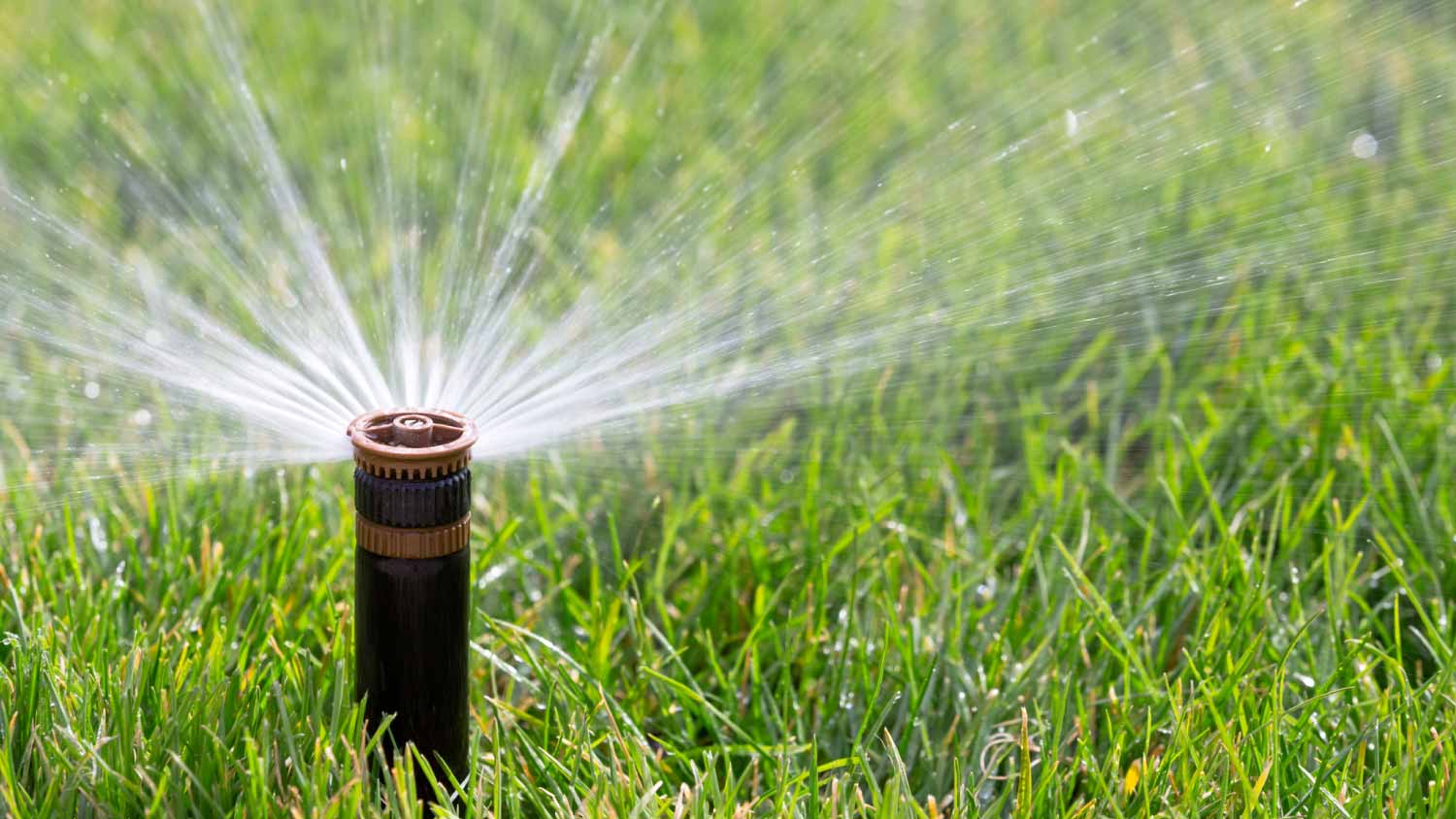Can an Irrigation System Leak if Turned Off? 8 Warning Signs
Don’t let sneaky leaks get the better of you


Irrigation systems can leak even if it’s turned off, indicating it needs immediate attention from an irrigation professional.
Broken sprinkler heads are a common cause of leaks in sprinkler systems.
Poor drainage, often caused by changes in your yard setup, can cause leaks.
Sprinkler heads can leak when turned off if sprinkler valves are leaky, clogged, or broken.
Poor irrigation system maintenance causes more frequent and devastating leaks.
If your irrigation system is leaking water even when it’s turned off, that’s a cause for concern. A still-dripping system likely indicates that you have a leak on your hands. But don’t panic! We’ll show you more signs to watch for so that you can easily fix this problem before the water bill skyrockets.
1. Sprinkler Head Is Leaking When Off

One of the most obvious signs that there's a leak in the irrigation system is when there's a steady drip of water coming out of a sprinkler head long after it's been shut off. This is often indicative of a leaky valve, clogged valve, or broken or missing parts, like the diaphragm seal.
If this leak is a steady trickle that never stops and seems to be localized to one sprinkler head or zone, it's usually a leaky sprinkler valve.
2. There Are Sediment Deposits on the Sidewalk

Does it look like your sidewalk built a sand castle while you were out? Is it particularly fan-shaped, no less? This is a sign that one or more of your sprinkler heads are broken, and the leaking water is pushing soil onto the sidewalk.
3. You Have Unusually Taller or Darker Grass
Green grass is often a good sign that you're cultivating an enviably green lawn. But if you have patches of unusually lush-looking or tall grass near a sprinkler head or zone, this could be a warning sign. Too much water may be seeping into the ground because a sprinkler pipe broke or cracked. Once one pipe is compromised, the rest of the sprinkler system quickly becomes inoperable.
4. Water Spout Pressure Is Higher Than Normal

If the water spout is gushing like it's Niagara Falls, either the sprinkler head is broken or you've got a major leak in the irrigation system. If the irrigation line springs a leak, it vastly increases the water pressure. This is why it shoots into the air like a fountain.
5. There’s Slime or Fungal Growth
If mold or slime shows up on the curb, it's feeding off of a slow leak rather than a big one that would flood it out. This is probably caused by collected water draining to and leaking out of the lowest sprinkler head in your system and pooling into a specific area—a phenomenon called low-head drainage. This creates the prime conditions for fungal growth to thrive if it happens to go into a deep, dark crack in the curb.
These slow leaks can quickly turn into large, fast ones, which is why routine maintenance from your local sprinkler repair service is so important—it can prevent these leaks from happening in the first place.
6. Sprinkler Sprays Dirty Water
Just like how you don't want brown water gushing out of your bathroom faucet, dirty water is a grim surprise you don't want coming out of your sprinklers. Trapped sediment in the sprinkler system from a clogged or leaky valve might be the culprit, but a ruptured line can also cause soil to make it into the sprinkler line and spray your lawn with mud instead of clean water.
7. Areas Between Sprinkler Heads Are Flooded
If there's some flooding between sprinkler heads, it's usually because of a minor line rupture. The lateral lines in the ground underneath the sprinkler heads can crack or break, causing a leak that pushes everything above it upwards. The sprinkler heads themselves can start leaking as a result.
8. Sprinkler Spray Isn't Traveling as Far as Normal
Just like with the dirty water problem, a ruptured line can cause the sprinkler head not to spray as far as it typically would. Clogs and changes in soil can also constrict the flow of water. Cracked pipes leach out the water, meaning the sprinklers don’t have enough water to spray as far as they normally would.
Many of these sprinkler system issues can be fixed quickly and easily with the help of a pro, especially if you catch them early and stay on top of regular maintenance. On average, home sprinkler system repairs cost $270, with a typical range of $130 to $410. Not the best news for those on a tight budget, but it’s certainly better than having to pay for an entirely new system.
You should turn your irrigation system off for the winter to prevent complications that arise from freezing temperatures. This should take place in early fall and by Halloween at the latest. You don't want to turn it off too early, but waiting until November when temperatures start approaching the thirties might be too late. Your irrigation system should be shut off before freezing temperatures arrive.
Low-head drainage often causes puddles to appear around sprinkler heads. It's when the lowest head in that zone drains the water from the sprinkler pipes. It's usually not a sign of a leak, however. It's just functioning as a drain due to the low elevation. The puddle will go away after the drainage stops since all the residual water will have leaked out of the piping system.
Water in sprinklers is subject to gravity like everything else. It tends to seek out equilibrium and will drain to the lowest elevation in what's known as low-head drainage. Water that isn’t sprayed from the sprinklers doesn’t specifically “rest” in the sprinkler lines, but it can stay there until it’s either sprayed out in normal usage or blown out with an air compressor prior to winterization.















